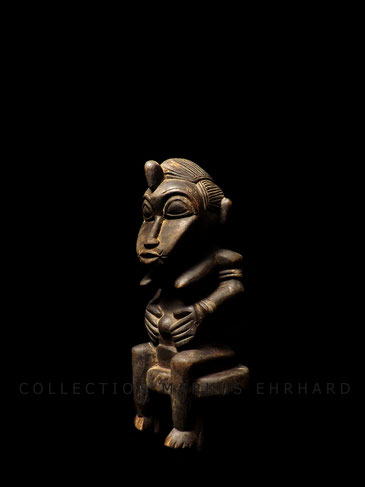Doh Soro
Doh Soro was one of the strongest carvers of the Senufo in recent time. Also the name Nambé Siriki circulates. It can not be identified, if that is his Senufo name. Sometimes a famous carver has different names depending on their status of Poro or on their religion. It is for sure, that he had a short time of active working. All researched informations agree that he suffered from mental disorder at the age of 35. It is not confirmed, that he is still alive. Information about health issues are kind of taboo.
His sculptures like Tugubele or Maternité statues, music instruments as the Debelé and especially his Kpelié masks are rare. Doh was specialized in maternity statues. He was not a famous carver, so it still is very difficult to research. Informations vary. But his work is to identify, because of the expressiveness and uniqueness of his compact sculpture. His style characteristics, like the large hands or bulky bodies, are not quite in the sence of Senufo aesthetic and not worth to imitate by other carvers.
Different stages of development can be recognized in his work. Early masks look pure and simple, masks made later are more complex in their own uniqueness. All of his Kpelié masks are carved extremely thin, the back show an enourmous volume. His early figures have flat eyes and the face has a heart shaped frame. Subsequent works reveal an extreme conception of physicality that has nothing to do with human anatomy. Characteristic for his masks and statues is the oval shaped mouth with rectangular teeth.
The different stages of tribal usage and patina can be compared in his work. Sometimes a statue looks like washed or sanded, another time a statue is completely dark because of black stain. His carving is very precise and he was very aware about shape, proportion and how to set for example a Maternité with twins on her lab together.

Tugubele couple, carved by Doh Soro, Koulé from Djemntene, region of Korhogo. Early work.
Woman: 29,0 x 8,0 x 8,0 cm, wood.
Man: 30,5 x 8,0 x 7,5 cm, wood.
Not published yet.

Maternité, carved by Doh Soro, Koulé from Djemntene, region of Korhogo. Early work.
27,5 x 10,5 x 9,0 cm, wood.
Not published yet.

Little Tugubele girl, carved by Doh Soro, Koulé from Djemntene, region of Korhogo. Early work.
18,5 x 7,5 x 7,0 cm, wood.
Literature:
- Wenn Urform Form bestimmt, Markus Ehrhard, pages 142 - 143, 145.

Maternité, carved by Doh Soro, Koulé from Djemntene, region of Korhogo.
32,0 x 12,5 x 12,0 cm, wood.
Literature:
- Wenn Neuordnung Ordnung schafft, Markus Ehrhard, pages 114 - 115.
- Wenn Urform Form bestimmt, Markus Ehrhard, page 145.

Maternité, carved by Doh Soro, Koulé from Djemntene, region of Korhogo.
26,0 x 10,5 x 10,0 cm, wood.
Literature:
- Wenn Urform Form bestimmt, Markus Ehrhard, pages 140 - 141, 145.

Large Maternité, carved by Doh Soro, Koulé from Djemntene, region of Korhogo.
55,5 x 19,0 x 16,0 cm, wood.
Not published yet.

Kpelié mask, carved by Doh Soro, Koulé from Djemntene, region of Korhogo. Early work.
34,0 x 16,0 x 9,0 cm, wood.
Literature:
- Wenn Urform Form bestimmt, Markus Ehrhard, pages 146 - 149.

Yêchikpleyégué, double faced Kpelié mask, carved by Doh Soro, Koulé from Djemntene, region of Korhogo.
34,0 x 18,0 x 9,5 cm, wood.
Literature:
- Wenn Neuordnung Ordnung schafft, Markus Ehrhard, pages 116 - 117.

Kpelié mask, carved by Doh Soro, Koulé from Djemntene, region of Korhogo.
38,0 x 16,5 x 8,5 cm, wood.
Literature:
- Wenn Neuordnung Ordnung schafft, Markus Ehrhard, pages 118 - 121.

Welcome to the first archive documentating the artwork of 26 named Senufo carvers from 1900 till today. We present antique and recent sculptures of so-called masters and not that famous carvers.
All our images have copyright markings. Feel free to download our content and images. In case you publish or share our content or an image on other platforms, like Facebook or Pinterest, please name the source and link to this website. All images are highly detailed printed with more information in our books, available at Ornito.

